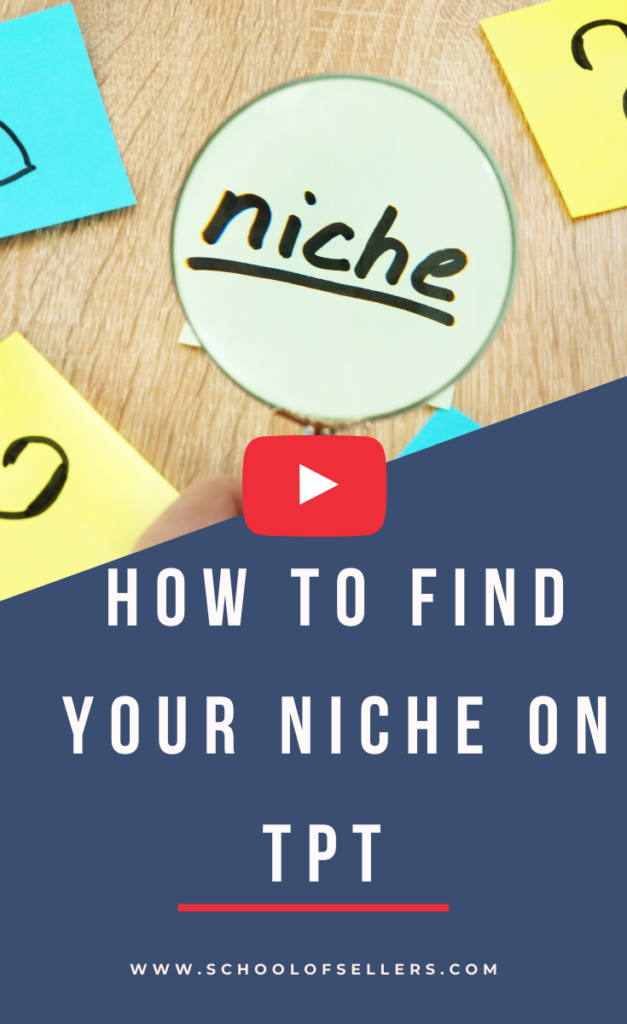You’ve probably heard that you need to find your niche on TeachersPayTeachers in order to be successful. That’s great, but how exactly do you go about doing it? And how the hell do you even pronounce the word niche anyway? Settle in because I’ll be answering these and all of your other burning questions in this blog post. As you read, I encourage you to download our Riches Are in the Niches handout to help you think through the process and keep track of your ideas. Just fill out the form right below this image to get your free copy.

What is a niche?
How do you say it?
First, let’s talk about pronunciation. Is it pronounced niche like it rhymes with sheesh? Or is it niche like it rhymes with pitch? The good news is, it’s both! Good ol’ Merriam Webster confirms that either pronunciation is correct. I honestly switch back and forth, but I DO love reminding myself that “the riches are in the niches, bitches,” so I most often pronounce it that way. What about you? Are you #teamneesh or #teamnitch? I’d love to hear in the comments below.
A Niche, Defined
Now that we’ve got that important debate settled, let’s talk about what a niche is and why it’s important. In the TpT world, a niche refers to your specialty or an area of expertise. When someone says to find your niche, they’re telling you to find a specific area of expertise that will set you apart from others. It’s basically your “thing,” or a set of topics that you know a lot about. Most of your resources will relate to the topic in some way, and your niche will be used to guide your decision making when it comes to deciding which products to create, where to find your audience, how to market your resources, and more.
You can choose a niche based on different factors. For example, it might be based on a particular grade level like 3rd grade, a certain subject like social studies, a location like Texas or Ontario, or a narrower topic like classroom management. You might also combine multiple topics to form your niche. For example, you could be an expert on 3rd grade social studies or classroom management for high school. The good news is that you can find success on TpT with both broadly and narrowly defined niches.
Why Is It So Important to Find Your Niche on TeachersPayTeachers?
When you have a defined niche, you’ll attract a specific group of people for your audience. At first, you might think having a smaller audience is a bad thing, but that’s not necessarily true. Here are 4 reasons why you should find your niche on TeachersPayTeachers.
The Benefits of a Niche
1. Easier to Engage with Your Audience
A smaller, more targeted audience means you’ll have fewer customers. That makes it easier to engage with them through your TpT feedback, Q&A, social media, and email marketing. Take advantage of the fact you don’t have a million customers by trying to get to know them a little and nurture those relationships. Use what you learn about your audience to target your marketing and provide excellent customer service.
2. Reduced Competition
There are a lot of sellers already on TpT, and more join the site everyday. That can feel really overwhelming when you’re just getting started. The good news is that if you take the time to carve out a niche for yourself, you’ll also be reducing the amount of competition you have. The more specific your niche, the fewer people you will have to compete with when it comes to selling your products.
3. Establish Expertise
Finding your niche on TeachersPayTeachers also helps you to establish expertise. When you focus on a specific topic, you’re more likely to get really good at it. You’ll be able to create higher quality resources and content related to the topic, and even better, your audience will start to view you as an expert. When you identify a niche, it becomes easier to describe what you do. Customers will start to see you as THE go-to person when it comes to your specific niche. This will lead to more customer trust and brand recognition. Established expertise also leads to more growth by word of mouth. You can become known as “the classroom management lady,” for example. What do you think will happen when someone asks one of your fans about classroom management? They’ll say, “Oh you should check out ____, the classroom management lady on TpT. I love her stuff.”
4. Your Audience is More Likely to Buy
We already talked about how it’s easier to engage with a smaller audience, but it’s also easier to sell to them. When you have a specific niche, the people who choose to follow you are coming for a very specific reason. You don’t have to do a ton of research about the kinds of resources they’re interested in because you already know they’re looking for materials related to a specific topic. They’re also much more likely to be ready to buy than a larger audience who may not be familiar with your niche. Niche audiences are considered “warm” audiences because they’re following you for a specific reason. They’re not just casual shoppers who happened to wander by and might be more interested in browsing rather than buying. Because of this, they are usually more receptive to marketing and are more likely to buy.
How to Find Your Niche on TeachersPayTeachers
So far we’ve talked about what a niche is and the benefits of having one. Now it’s time to talk about how to actually find your niche on TeachersPayTeachers. There are four broad questions you should ask yourself to help you think through finding your niche. As you’re thinking about your answers to these questions, I encourage you to write down anything that comes to mind as you brainstorm. You can always make revisions later. Remember to use your Riches Are in the Niches handout to guide your thinking! (Just fill out the form below if you don’t have the handout yet.)
1. What are you passionate about and interested in?
This is an important question to start with because you don’t want to be creating resources that bore you. Choose areas of focus that will provide a little extra motivation simply because you enjoy the subject, topics, grade level, format, etc. It’s okay to write down multiple passions and interests at this point, even if they don’t seem to relate to one another. It’s also important to consider your passions outside the field of education, so make sure you write down personal interests like reading, traveling, sports, etc. too.
2. What are you good at?
Remember that you want to choose a niche that will be sustainable for you. I know being good at something helps keep me motivated, and I’m usually better at things I’m passionate about, so I think it’s important to think about what you’re good at when it comes to identifying your niche. You’ll also want to choose something you’ve had experience with. For example, it doesn’t make sense to choose distance learning as your niche if you’ve only ever taught in person.
What subjects and topics do you feel comfortable talking about? What have your colleagues told you you’re good at? For example, if you get lots of compliments on your bulletin boards and classroom décor, you could start there. If other teachers are always coming to you for classroom management advice, this could be a great direction for you to take. Think about related skills too. Are you really good at organization? Do you have a gift when it comes to building relationships with your students? Write down anything you think might be useful, even if it’s as simple as being able to submit your attendance on time everyday. Also, give yourself a pat on the back for that because it’s an accomplishment.
3. What are some problems that your target audience struggles with?
You want to identify a niche where there is a demonstrated need. Think about your responses to the first question as you think about this one too. Have you ever looked for something on TpT and couldn’t find it? That would be a great place to start! Look for gaps, even if they’re tiny. Join teacher Facebook groups to see what other teachers need and are asking about. These groups are also a great place to learn how your audience talks about their struggles. Make note of the specific vocabulary they use so you can use the same terms to market your resources once they’re created.
4. Is there room to set yourself apart from the competition? How?
Unless you have a very narrow and specific niche, odds are that other people are already creating resources for the area of focus you’re interested in. That’s perfectly normal and to be expected. But now it’s time to start thinking about how you can stand out from the competition. Do you have a certain way of doing things that would make your resources more desirable than what already exists? Can you include other pieces that existing resources don’t have? How can you blend your subject matter knowledge with your personal interests in a way that makes your products super engaging for students? What kind of spin can you put on the design and overall aesthetic of your resources to distinguish them from others? What will make your products unique?

Other Things to Remember About Finding Your Niche on TpT
Remember that one of the main points of finding a niche is that it provides a direction for your business. Use it to guide your choices when it comes to decisions like which products to create, when to create them, where to find your audience, and how to market your resources. At the same time, remember that a niche is not a cage and that it’s just one facet of your business. Here are a few other thoughts about niches to keep in mind:
You Do Not Have to Find Your Niche on TpT Right Away
I think it’s important to note that you don’t have to find a niche right away. Sometimes it can even take years to find a niche. There are also many sellers who have found success without having a niche at all. I think they’re the exception to the rule, but the point is that you shouldn’t stress too much if you don’t find your niche right away. Explore some of the ideas you identified in your brainstorming and see where they take you.
A Niche Doesn’t Mean You’re Locked In
Just because you have identified a main focus doesn’t mean you have to only create products or content related to that specific niche. Creating only very specific types of products within a narrow niche can actually lead to boredom and burnout. So don’t be afraid to branch out a little and try new things, especially if you’re new to TpT. I’m someone who gets easily bored if I’ve created too many related products, so I branch out from my main niche all the time. Some of my non-niche resources sell very well, and they give me a needed break that helps keep me motivated in my business.
Niches Can Change and Evolve
Another thing to note about niches is that they can evolve over time. You might start your store thinking you want to work in one niche, but then later realize that you’re passionate about something else. That’s perfectly fine. Do what feels right for your business!
We would love to hear your thoughts about choosing a niche in the comments below. Need a little bit more help thinking through the questions and deciding on a niche? The School of Sellers 101 Facebook group is a perfect place to get feedback and ideas. Let us know how we can help!

Let’s connect! Follow us on the podcast, the Facebook group for new sellers, the Facebook group for established sellers, YouTube, Instagram, and TikTok!





